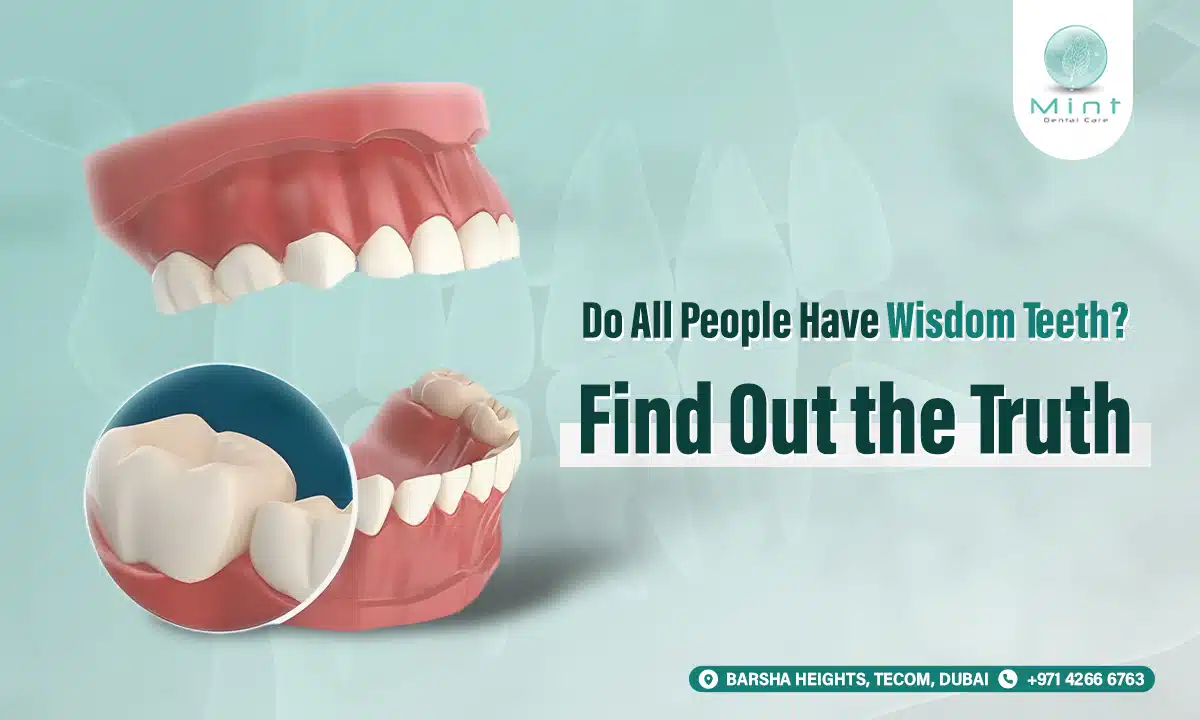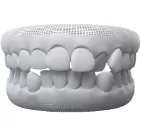Have you ever felt a lingering ache at the back of your mouth and wondered if it might be related to your wisdom teeth? Do you sometimes question whether it’s truly necessary to remove these late-blooming molars? Such uncertainties are common, especially in a bustling city like Dubai, where busy schedules can make it easy to overlook oral health concerns. Wisdom teeth—also called third molars—often spark numerous questions about pain, infection, and overall necessity.
In this comprehensive article, we’ll delve into the world of wisdom teeth, exploring why some people don’t have them at all, what risks they pose when they do appear, and how top dental clinics in Dubai handle their removal or long-term care.
What Are Wisdom Teeth?
Contrary to what the name suggests, wisdom teeth don’t actually imbue you with extra insight or intelligence. They’re simply the last set of molars that typically emerge between the ages of 17 and 25, a period once considered a more “mature” phase of life. Because our ancestors consumed tougher foods that could wear down their teeth more quickly, these extra molars were once essential.
Yet, our modern diet in Dubai and worldwide has evolved, often featuring softer foods and advanced cooking methods. This shift has made large jaws less of a necessity. Consequently, when wisdom teeth start to appear in smaller jaws, they can create a host of potential issues. Are you already questioning whether you actually need these extra molars at all? Keep reading, and you’ll find out they can be both helpful and problematic—depending on your unique dental situation.
Why Do Some People Never Develop Wisdom Teeth?
Have you ever met a friend who never had to deal with wisdom teeth removal and wondered how they got so lucky? If you’re in that situation, you might ask yourself: “Will I ever develop wisdom teeth, or have I dodged that bullet completely?” Genetics, evolution, and changes in our diets all play a role in the varying presence of third molars among different individuals. In fact, studies show that around 35% of the population never develops wisdom teeth at all—a condition known as wisdom tooth agenesis.
For those living in Dubai’s cosmopolitan environment, not having wisdom teeth is generally seen as a positive outcome because it usually means less crowding and fewer potential oral health complications. However, if you’re part of the majority who do develop these teeth, don’t fret. Early detection methods such as regular dental X-rays can help your Dubai dentist decide whether your third molars might become a problem, allowing for timely intervention before serious issues arise.
Are Wisdom Teeth Still Relevant Today?
In centuries past, wisdom teeth served a clear purpose: They stepped in as additional chewing surfaces when other molars wore down or fell out, a common occurrence before the era of modern dentistry. Yet today, especially in a place like Dubai where advanced dental care is widely available, wisdom teeth often do more harm than good. Our jaws have evolved to be smaller, and our diets rarely require the robust chewing force that extra molars once provided.
So, do you really need these third molars anymore?
- For some people, wisdom teeth erupt normally and help with chewing, posing no immediate problems.
- For many others, they’re superfluous and lead to complications such as crowding, impaction, and frequent infections.
Your best bet is to consult with a reputable dentist in Dubai to assess whether these teeth will peacefully co-exist with your dental anatomy or become a source of trouble.
Why Might Wisdom Teeth Cause Problems in Dubai?
It’s natural to wonder whether there’s something unique about living in a fast-paced city like Dubai that might exacerbate wisdom teeth issues. While geographic location doesn’t directly impact the anatomical challenges posed by wisdom teeth, the city’s dynamic lifestyle often means busy residents might postpone dental check-ups. Over time, even minor wisdom tooth issues can escalate into major complications if left unchecked.
Common problems include:
- Crowding: When there’s insufficient space in your jaw, third molars can push against neighboring teeth, causing misalignment.
- Partial Eruption: This can trap food and bacteria under the gum flap, leading to inflammation or infection.
- Complete Impaction: When wisdom teeth never break through the gums, they remain lodged in the jawbone, potentially causing cysts or damage to adjacent roots.
When you factor in a hectic Dubai schedule that leaves little time for routine dental appointments, the need for timely intervention becomes even clearer.
When Should You Remove Wisdom Teeth?
If you’re feeling persistent pain or noticing that your other teeth are slowly shifting, it’s natural to ask: “Is it time to have my wisdom teeth taken out?” Generally, dentists or oral surgeons in Dubai recommend removal if:
- There is clear crowding or misalignment caused by emerging wisdom teeth.
- The tooth is impacted and cannot erupt naturally, posing a risk for infection or cysts.
- Recurrent gum inflammation or pericoronitis (infection of the tissue around a partially erupted tooth) keeps happening.
- Decay or decay risk is high due to the tooth’s awkward position, making it tough to clean.
However, removal isn’t automatically the go-to answer for everyone. If your wisdom teeth are properly aligned, pain-free, and pose little risk to oral health, many dentists advocate a “watch and wait” approach, supplemented by regular check-ups to ensure problems don’t develop later.
Question to the Reader: Have you been experiencing any persistent discomfort or pain in the back corners of your mouth? If so, it might be time to consult a dental professional in Dubai to see if extraction or another form of treatment is necessary.
What Are the Main Myths Surrounding Wisdom Teeth?
Did you hear someone say, “Everyone must remove their wisdom teeth”? Or perhaps you’ve been told, “It’s only painful if they are impacted.” The truth is more nuanced than these broad statements suggest. Let’s address some misconceptions:
- Myth 1: All wisdom teeth must be extracted.
Not necessarily. If they grow in normally and remain easy to clean, extraction may not be required. - Myth 2: Wisdom teeth always cause extreme pain.
Pain levels vary greatly; some individuals barely notice their emergence, while others face significant discomfort. - Myth 3: If they don’t hurt now, they’ll never be a problem.
Issues can appear later, even after years of having no symptoms, which is why regular monitoring is important.
Each patient’s experience is unique, making it critical to rely on professional evaluations rather than second-hand anecdotes or blanket generalizations.
Is Wisdom Teeth Extraction Essential for Everyone in Dubai?
If you live in Dubai, you’ve likely come across a range of opinions regarding the necessity of wisdom teeth extraction. Some dentists advocate for early removal to preempt potential issues, especially if X-rays reveal they’ll likely grow in improperly. Others prefer to hold off unless complications arise, maintaining a more conservative approach.
Two paragraphs to consider:
- The Early Intervention Approach
Some dentists believe in extracting wisdom teeth before they fully develop, particularly if the jaw appears too small to accommodate them. By intervening early, you may avoid the pain of impacted teeth and reduce the need for more complex surgeries later. This can be especially beneficial for younger patients, whose bone tissues are more pliable, leading to quicker recovery times. - The Watchful Waiting Approach
Other dental professionals recommend monitoring wisdom teeth closely through periodic X-rays and check-ups. If no signs of infection, crowding, or decay surface, they see no immediate need for extraction. In these cases, they advise patients to maintain vigilant oral hygiene and remain alert for early warning signs.
How Are Wisdom Teeth Removed?
If you’ve reached the point where removal is either recommended or inevitable, you’re probably wondering what the procedure entails. The good news is that wisdom tooth extraction is a standard outpatient procedure in Dubai, carried out by skilled dentists or oral surgeons.
- Initial Consultation
- Your dentist reviews your medical history and X-rays.
- Any concerns about anesthesia, sedation, or post-surgery recovery are addressed here.
- The Extraction Process
- A local anesthetic (or general anesthesia, depending on complexity) is administered.
- If the tooth is impacted, your surgeon may make a small incision in the gums and might section the tooth into smaller pieces for easier removal.
- Stitches may be placed to speed healing and minimize bleeding.
- Aftercare Instructions
- You’ll be advised to rest, use cold compresses for swelling, and stick to a soft or liquid diet initially.
- Pain medication and mouth rinses could be prescribed to keep the surgical site clean and to manage discomfort.
By following your dentist’s post-operative guidelines closely, you can usually resume normal activities within a few days.
What Is Recovery Like After Wisdom Teeth Removal?
If the thought of post-extraction pain worries you, take comfort in knowing that most patients in Dubai recover smoothly. Yes, you may experience some discomfort, swelling, and mild bleeding initially, but these symptoms typically subside within the first few days. Over-the-counter painkillers or any medication prescribed by your dentist can help manage any pain or soreness.
It’s also important to avoid certain actions that could jeopardize healing:
- No Smoking: Smoking can dislodge the protective blood clot and lead to a painful condition called dry socket.
- Skip the Straw: Suction from straws can similarly disturb the blood clot, slowing down your recovery.
- Gentle Brushing: While oral hygiene remains crucial, you’ll need to brush around the extraction site carefully.
Question to the Reader: Are you prepared to take a few days off your regular routine to give your mouth ample time to heal? Planning your schedule around the recovery period can make the experience much less stressful.
What Are the Potential Risks and Complications?
Like any surgical procedure, wisdom teeth extraction carries certain risks. Although the surgery is generally safe, it’s good to be aware of possible complications:
- Infection: Bacteria can enter the extraction site, causing pain, redness, and swelling.
- Dry Socket: This occurs if the protective blood clot dislodges too soon, exposing the bone and delaying healing.
- Nerve Damage: A small risk of injury exists for the nerves in the lower jaw, which can result in numbness or tingling, though this is often temporary.
Remember that these complications are relatively rare, especially when you choose a qualified dental professional in Dubai. By heeding your dentist’s pre- and post-operative instructions, you can significantly reduce the likelihood of experiencing any severe issues.
How Should You Care for Wisdom Teeth If They Remain?
Not everyone in Dubai needs to bid farewell to their wisdom teeth. If yours have come through without a hitch and show no signs of infection or crowding, you can keep them indefinitely—provided you take diligent care of them. However, you might wonder: “How do I keep these hard-to-reach teeth clean?”
- Meticulous Brushing: Angle your toothbrush to reach the far corners of your mouth, cleaning all surfaces thoroughly.
- Flossing: Slipping floss around the back of the wisdom teeth helps remove trapped food particles.
- Antibacterial Mouthwash: An extra layer of protection against bacteria build-up.
Make regular dental check-ups a priority. Even if you think your wisdom teeth are doing fine, a seasoned Dubai dentist can catch early signs of decay or infection before they evolve into full-blown problems.
Can Wisdom Teeth Shift Other Teeth?
Many individuals invest heavily in orthodontic treatments—like braces or aligners—and worry that emerging wisdom teeth could undermine their newly straightened smile. This concern often leads to the question: “Can wisdom teeth actually move my other teeth?” While some dentists argue that wisdom teeth can exacerbate shifting, especially in smaller jaws, research suggests that tooth movement is a broader process influenced by factors like natural aging and jaw growth.
Nevertheless, if your wisdom teeth are visibly pressing on neighboring molars, extraction may be advised to prevent further misalignment. For those who recently completed orthodontic treatment, this step can safeguard your investment by avoiding a recurrence of crowding. Once again, regular assessments by a reputable Dubai dental clinic remain your strongest line of defense against unwelcome surprises.
Which Recovery Myths Should You Ignore?
Myth: “You can’t eat for days after wisdom teeth removal.”
Reality: While you should stick to soft or liquid foods initially, you can typically resume a more diverse diet within a few days—just avoid crunchy or sticky items until the extraction site heals sufficiently.
Myth: “Brushing is off-limits post-extraction.”
Reality: Gentle brushing around the surgery site is encouraged after the first 24 hours. Maintaining clean teeth and gums helps prevent infection.
Myth: “You must cancel all activities for a week.”
Reality: Many people return to their daily routines, including work or school, after a short rest period of two or three days, although everyone heals at a different pace.
Question to the Reader: Have these myths influenced your perspective on wisdom teeth removal? If so, discussing them with your Dubai dentist might help clarify any lingering doubts.
How Can You Avoid Post-Extraction Complications Like Dry Socket?
Dry socket is one of the most uncomfortable complications that can occur after having your wisdom teeth removed. If you’re worried about this happening to you, the best strategy is prevention. Start by closely following the aftercare steps your dentist in Dubai provides.
- Avoid Suction: Whether through smoking or using a straw, the sucking action can dislodge the protective clot.
- Stick to Soft Foods: In the initial days, choose foods that require minimal chewing, like mashed potatoes, yogurt, and smoothies.
- Don’t Skip Oral Rinses: Gently rinsing with warm saltwater can help keep the area clean without dislodging the clot.
If you notice persistent or worsening pain a few days after your extraction, particularly accompanied by a foul smell, contact your dentist as soon as possible. Early intervention can prevent a minor issue from escalating into a painful ordeal.
Are There Alternatives to Wisdom Teeth Extraction?
For some Dubai residents, it might come as a relief to hear that extraction isn’t the only path. Depending on your specific situation, your dentist may suggest other management techniques, such as gum contouring to create more space around partially erupted wisdom teeth or orthodontic solutions that reposition teeth to reduce crowding. However, these alternatives generally apply only when the teeth have room to emerge and remain healthy.
If your third molars are impacted, decayed, or frequently causing infections, extraction is often the most definitive solution. Postponing necessary removal can lead to even bigger problems in the future, including damage to surrounding teeth or the development of serious gum disease. Ultimately, a thorough consultation with your Dubai dentist will determine which course of action aligns best with your oral health needs.
What Key Questions Should You Ask Your Dentist in Dubai?
Unsure about what to bring up during your next dental appointment? Here are a few suggestions that can help you get clarity on your wisdom teeth:
- “Do my X-rays show enough space for my wisdom teeth to erupt normally?”
- “If extraction is needed, what type of anesthesia do you recommend?”
- “How long will the entire healing process likely take for someone of my age and health?”
- “Are there any preventive measures to keep my wisdom teeth healthy, if we choose not to remove them?”
Asking these questions can help you form a more accurate picture of your oral health. A knowledgeable dentist will welcome your curiosity and provide well-informed answers tailored to your individual situation.
Are Regular Dental Check-Ups Crucial for Wisdom Teeth?
Yes, and it’s especially true for individuals residing in a city as active as Dubai. With professional and personal obligations, it’s easy to let your oral health slide, but skipping routine check-ups can lead to undetected issues like gum infections or the gradual decay of partially erupted wisdom teeth. During these appointments, dentists often use digital X-rays or 3D imaging to catch problems before they evolve into serious concerns.
Why is this so important?
- Early Detection: Even symptomless wisdom teeth might be growing at an awkward angle.
- Professional Cleaning: Hard-to-reach spots around wisdom teeth can harbor plaque and bacteria.
- Customized Advice: Regularly seeing a Dubai-based dentist allows you to discuss lifestyle factors—diet, smoking habits, or time constraints—that may affect your oral health.
Will Wisdom Teeth Grow Back Once Removed?
A common question is whether wisdom teeth can regenerate after extraction. In short, the answer is no. Human adults have only one set of permanent teeth, including wisdom teeth. Once these third molars are removed, they don’t grow back. If you notice discomfort in the extraction area later on, it’s more likely due to gum or bone changes rather than a new tooth emerging.
However, it’s not unusual to require a follow-up appointment. Sometimes, patients experience minor post-surgical complications like bone spurs or minor infections, which can feel like a new tooth is growing in. A quick check-up with your dentist in Dubai can confirm the cause of any lingering discomfort.
(FAQ)
Q1: Could wisdom teeth in the upper jaw affect my sinuses?
Yes, in rare situations, wisdom teeth located in the upper jaw can come into contact with your sinuses, potentially causing congestion or pressure.
Q2: Is it easier to remove wisdom teeth at a younger age?
Often, yes. Younger patients typically have softer bone tissue and partially formed roots, which can simplify the extraction process and hasten recovery.
Q3: Do orthodontists in Dubai require wisdom teeth removal before braces?
Not always. Some orthodontists prefer their removal if they appear likely to cause crowding, but others may work around them if they’re not problematic.
Q4: How quickly can I resume normal eating habits post-extraction?
Most people can start reintroducing soft and semi-solid foods within a couple of days. However, you should avoid hard or crunchy items until your dentist confirms it’s safe.
Q5: Can wisdom teeth removal alter my facial structure?
Any changes are generally minimal and often related to reducing swelling or infection. Removing problematic teeth can actually prevent jaw swelling, which might temporarily affect the shape of your face.
Conclusion
Wisdom teeth may be remnants of our evolutionary past, but they remain very much a part of modern dental discussions, especially here in Dubai. Whether you have a mouthful of healthy wisdom teeth or are facing impacted third molars that threaten to cause pain and crowding, the key is informed decision-making. Regular check-ups, early detection through X-rays, and frank conversations with your dentist can spare you from chronic discomfort or emergent dental crises.
Ultimately, wisdom teeth extraction isn’t universally mandatory. Many patients go through life without any complications from their late-blooming molars. If your wisdom teeth are properly aligned, pain-free, and easy to clean, there might be no pressing need to remove them. However, if they exhibit warning signs or create recurrent problems, timely removal can save you from more significant troubles down the road. Whichever category you belong to, consulting with a dedicated dental professional in Dubai will ensure you take the right steps toward a healthy, pain-free smile.
Are you ready to assess the state of your wisdom teeth? Schedule an appointment at a trusted Dubai dental clinic today to learn if extraction, monitoring, or an alternative treatment plan is most suited to your oral health needs. Your smile—and your peace of mind—are worth the effort.















